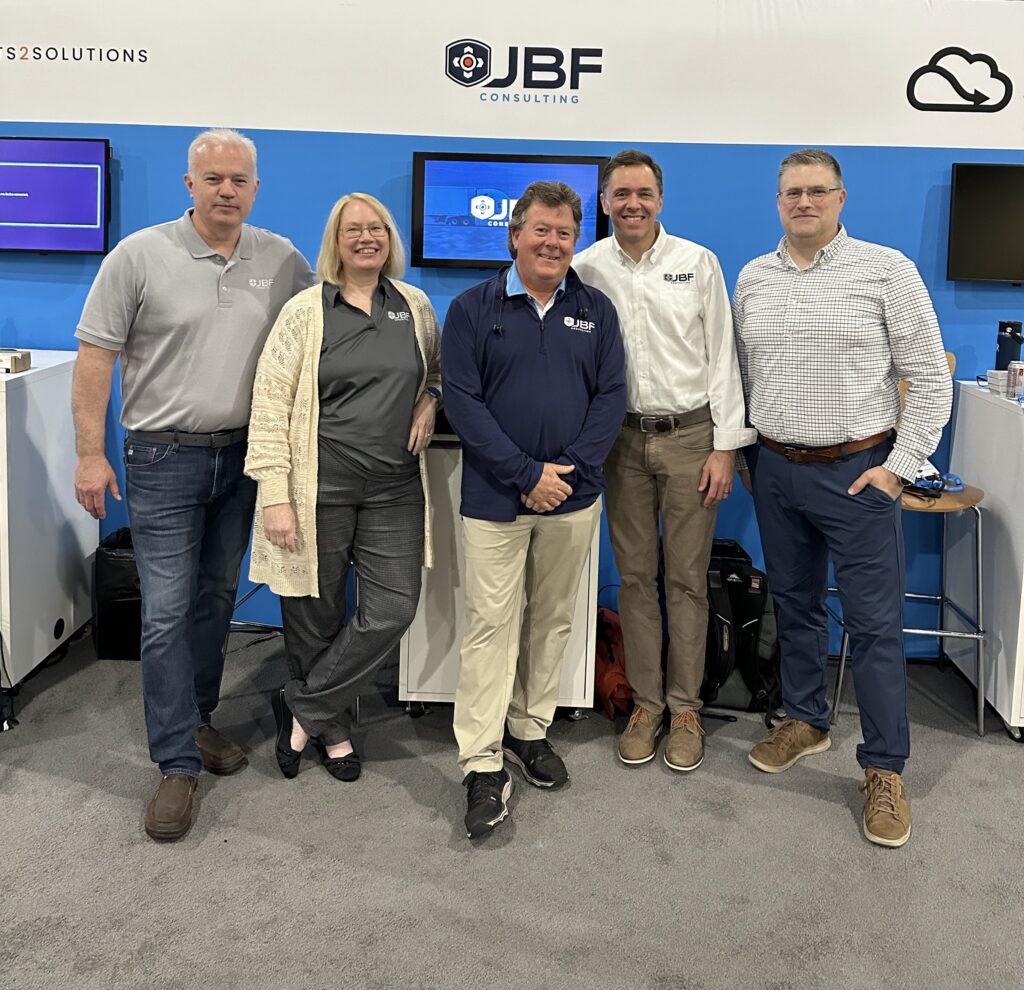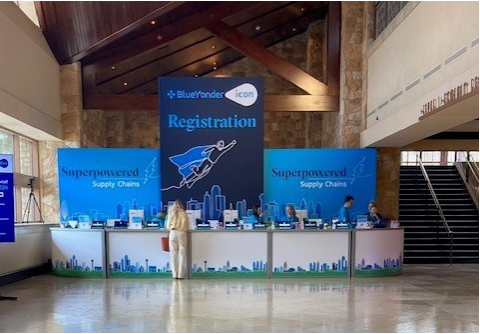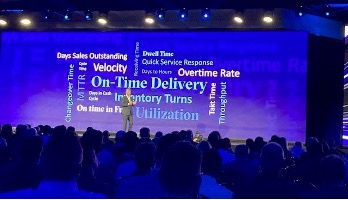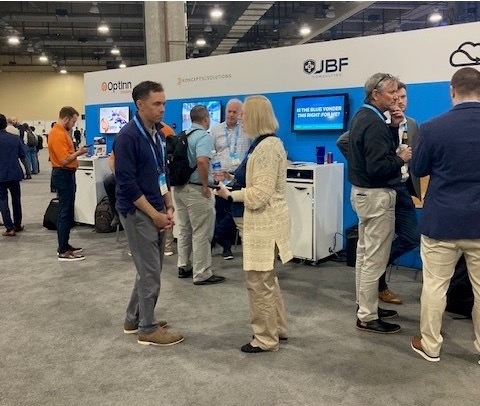When 2,000 supply chain leaders and industry experts gather, something big is happening. Blue Yonder's ICON event in Dallas, TX, became the epicenter of innovation and strategy, bringing together top professionals for an intensive series of General Sessions, breakout discussions, and targeted educational offerings.
As both an attendee and sponsor, JBF gained significant insights into Blue Yonder’s product roadmap, recent acquisitions, and customer initiatives.

Pictured here at the JBF booth are Kyle Stone, Bernadette Harmon, John Wilson, Brad Forester, and Justin Wilcox
The four main areas covered in this article are:
- End-to-End Platform Evolution
- TMS Roadmap
- Recent Acquisitions
- Conference Sentiment
"Blue Yonder’s current product strategy revolves around several core tenets: Composable Journeys, Cognitive Planning Solutions, and Generative AI Agents"
End-to-End Platform Evolution
This area of interest was woven into both the General Sessions and the Breakout Sessions with both highlighting the numerous product improvements, customer-driven innovations, and product roadmaps. All of these were touched on in one form or another, but there were not a lot of substantive details that accompanied them at the time of this writing. As a point of reference here is the Q1 2024 Company Highlights press release.
Blue Yonder’s current product strategy revolves around several core tenets:
- “Composable Journeys” where the customer is able to create a custom solution by combining products from their platform suite
- “Cognitive Planning Solutions" that are architected specifically for SaaS platforms that leverage AI, ML, and data clouds to provide customers with an interactive event-driven experience
- “Generative AI Agents” that provide access and insights to a customer’s supply chain using natural language
Product Improvements
As of the 2023.4 GA release of the TMS platform there were a number of fixes.
In the Procurement, Optimization, and Modeling space there have been improvements in palletization, 3D loadbuilding, optimization/distance server interoperability, and expansion of the AR routing guide capability.
On the Execution side, their booking revisions have been expanded, PCMiler has more integrated caching, and the TMS core has additional enhancements for multi-instance usage.
Lastly for the Fleet Management piece, the Fleet Dispatch UX has been revised for easier operation.
TMS Roadmap
The new features and upgrades for BY are quite voluminous. Most of these fall into either the Optimization or Execution space, with only a scattered few for the Fleet Management and Carrier/Supplier collaboration platforms.
“Planned” rollouts for the 2024.4 GA release:
Optimization and Modeling
- Ship/Load/Trip UX
- Optimization Request UX
- Load Plan Editing UX
- Rail Procurement Lane Surcharges
- Logistics Group Rating Parameters
- Rating Service
- Tariff Service Ingestion
Execution
- Smartbench Platform UX Look and Feel
- Job Service and API Outbound Scalability
- Parcel Hazmat Support
- Multi-Destination Rail Booking
- AR Rating based on AP Load Attributes
- Transportation Analytics ML
- Platform Data Cloud Sync Execution
- PCMiler Web Services Caching
- Event Streaming
“Future” Enhancements:
Optimization and Modeling
- Modeling UX and Modernization
- Procurement Modernization
- Capacity Service
- Continuous Optimization
- Tariff Service UX
- 3D Planning Service
- 3D Load Plan Edit
Execution
- Freight Auction Modernization
- Transportation Brokerage
- TMS Core UX Modernization
- ABPP Apps Modernization
- Rail Rule 11 Improvements
- PCMiler Rail Support
- Freight Financials UX
One of the more notable inclusions on the “Future Enhancements” list revolved around Standalone Fleet Management. This has been a sore spot in BY’s TMS ecosystem for years and revamping this process to give Fleet its own interface may be a welcome addition to the platform.
Another more imminent addition in the Collaboration space is the Trading Partner Network for TMS. It remains to be seen what exactly this functionality will entail, but any improvements in that space, especially the UX, would be welcomed as well.
Lastly there is a mention of Integrated Yard and Carrier Appointment Scheduling in the future roadmap which some may appreciate. This feature may address another pain point for customers that lack suitable integration between their TMS and YMS platforms.
"One of the more notable inclusions on the “Future Enhancements” list revolved around Standalone Fleet Management."
Recent Acquisitions
Blue Yonder has spent heavily on acquisitions in the last 12 months to plug some of their platform gaps.
The first of these recent acquisitions is Flexis, a supply chain platform provider. Some of Flexis’ products that are potential building blocks for BY are their Order Sequencing and Scheduling modules as well as their Transportation Planning and Scheduling modules.
The latter seems to be tailored to fleet and courier operations and this would be a big win for BY if they can successfully incorporate this into their ecosystem.
Overall the Flexis offerings look like a good way for BY to position themselves as an option for customers that are using JIT processes to run their operations.
Another notable addition to BY’s portfolio of companies is Doddle, a reverse logistics and return management platform.
Doddle works with largely retail and 3PL customers to optimize and simplify the challenging area of customer returns. Their platform deals with the first-mile and final-mile logistics to speed up return cycles and properly manage inventory. This provider also has an established network of pick-up/drop-off self-service kiosks.
Assuming that BY can fully integrate the Doddle ecosystem into their own platforms, it will give customers a powerful option to manage their reverse logistics.
Lastly, Blue Yonder is in the process of wrapping up the acquisition of One Network which will give it access to over 150,000 trading partners.
One Network’s primary value lies in its position between critical systems such as planning / execution, and inbound supply / outbound order fulfillment. This platform enables end-to-end visibility and provides control towers for managing communications.
Conference Sentiment
The ICON conference as a whole was well produced and very informative, but perhaps a bit heavy on marketing instead of engaging sessions.
As we spoke with BY representatives, customers, and vendors, we were able to parse through the marketing to gain an understanding of what BY was focusing on for the future as well as determine what its partners were looking for in upcoming releases. While the two are largely aligned, we get the sense that some are not sold on the AI and ML hype that is going into the platform. That’s not to say that they are useless, there are certainly cases that are tailor-made for ML such as YMS systems that use computer-vision ML to read ID numbers and plates on trailers.
There also seems to be somewhat of a mismatch in the “sustainability” features that Blue Yonder is touting in its products – many customers that we talked with did not share that same vision, especially in this inflation-laden environment.
Overall the attendees seemed very engaged and most sessions were well-attended. There were almost too many with close to 200 to choose from over the 4 days.
Many attendees are very interested in how they can traverse their own organizational silos, quickly recover from disruptions, and plan for the future requirements all within a single platform.
Key Takeaways
Blue Yonder certainly has the products (even more so with recent acquisitions) to accomplish this, but the deciding factor will be how well they are able to make all of the products work with each other to be truly integrated.
If optimizing your transportation management strategy to adapt to industry changes is a priority, engaging with JBF Consulting could be the right step forward.
RELATED POSTS
Fleet Solutions: Insights from the Descartes Innovation Forum
Data Quality & Trust Take Center Stage at Manifest 2024
Unpacking FourKites' Vision for Connected Supply Chains: A Recap of the 2023 Visibility Conference
Blue Yonder Luminate TMS Product Roadmap Review
5 Key Aspects of OTM Platform: 2023 Update
ORTEC 2023: Five Key Aspects – JBF Sentiment Rating™ Review
5 Key Aspects of BY’s New Luminate TMS Platform Reviewed
ebooks/white papers
Buyers Guide to Transportation Management Systems (white paper)
Justin Wilcox is a Senior Solution Architect with JBF Consulting and has 20+ years of experience in the Transportation and Supply Chain industry. He has lead numerous initiatives with an emphasis on solution design, modeling, and TMS implementations to create highly customized logistics solutions, especially within complex supply chain networks.
About JBF Consulting
Since 2003, we’ve been helping shippers of all sizes and across many industries select, implement and squeeze as much value as possible out of their logistics systems. We speak your language — not consultant-speak – and we get to know you. Our leadership team has over 100+ years of logistics and TMS implementation experience. Because we operate in a niche — we’re not all things to all people — our team members have a very specialized skill set: logistics operations experience + transportation technology + communication and problem-solving skills + a bunch of other cool stuff.
JBF Investor Advisory Services
JBF Investor Advisory Services provides due diligence guidance to private equity and VC firms. We bring decades of log-tech software expertise that has been honed by working closely with our shipper clients to evaluate and implement log-tech solutions.
JBF investment guidance Log-Tech focus areas:
- Transportation Management Fleet Management
- Yard Management
- Parcel Management Routing and Scheduling
- Logistics Modeling
- Digital Freight Brokerages Visibility / Analytics Transportation / 3PL Managed Services







